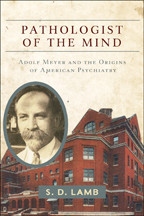
Reviews
Fortunately for anyone wishing to learn about Meyer's ideas and their influence, Lamb, a historian, has mined his unpublished papers and correspondence for the truths that became opaque when he turned them into essays. Crucially, she has also read more than 1,800 of the meticulous patient records that Meyer and his staff created at the Phipps Psychiatric Clinic, which reveal him at work as a clinician and teacher. These she presents as the key to understanding how he created an American psychiatry with his ideas at its center. The result is a tutorial in Meyer's psychobiology, and a fascinating look at patients' experiences, their suffering, and treatment in the early 20th century.
In this fascinating study, Lamb examines Meyer's efforts to establish psychiatry as a clinical science and subdiscipline of biology... This book is a medical historian's dream.
Full of interesting information on how Dr. Adolf Meyer, a Swiss neurologist and psychiatrist, set the basis for modern psychiatry in the United States.
[Lamb] aims to give us a more detailed and rounded portrait of Meyer's life and career.
Some books are worth underlining every sentence. Pathologist of the Mind is one of them.
Lamb’s intellectual and professional biography will inevitably stimulate further historical research on Adolf Meyer’s influence on American psychiatry.
Pathologist of the Mind clarifies Meyerian notions of psychobiology, psychotherapy, and evolutionary theory (among others) and places this important figure, as well as the hospital and area of specialty to which he was dedicated, into historical context. In impressively detailed fashion, the book brings the man and the era to life.
[D]eeply researched, judiciously argued and succeeds in making he nature of Meyer's contribution more intelligible.
Lamb successfully revives and humanizes Meyer as a meaningful character in the unfolding drama of American psychiatry.
Lamb's descriptions of patient-staff enounters offer insights not generally found in traditional histories.
Pathologist of the Mind clearly articulates the techniques and methods of reasoning that set Adolf Meyer's approach apart from those of his contemporaries. His clinical empiricism made for a quintessentially American approach to psychiatry: inclusive and practical, but unrestrained by too many theoretical considerations. Many, perhaps most, psychiatrists know that Meyer is an important figure in American psychiatry, but usually don't quite know why. Dr. Lamb's superb book makes the reasons pellucidly clear.
Lamb looked in the right place to find the real Adolf Meyer—his detailed case histories of patients. Meyer was a superb brain scientist and neuropathologist, but he was convinced that this alone was an insufficient frame for understanding the problems of psychiatric patients. The dynamic tensions which drove him to formulate his patient-centered 'psychobiological' approach are the same tensions we see and argue about in the field of psychiatry today.
Book Details
Acknowledgments
Introduction
1. Pathology as Method
2. Mind as Biology
3. Unique Soil in Baltimore
4. The Baptismal Child of American Psychiatry
5. A Wonderful Center for Mental Orthopedics
6. Subconscious
Acknowledgments
Introduction
1. Pathology as Method
2. Mind as Biology
3. Unique Soil in Baltimore
4. The Baptismal Child of American Psychiatry
5. A Wonderful Center for Mental Orthopedics
6. Subconscious Adaptation
Conclusion
Notes
Index





